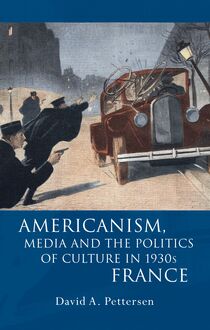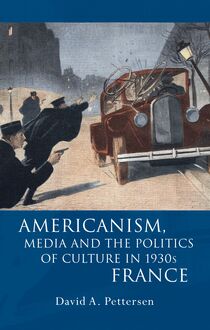-
 Univers
Univers
-
 Ebooks
Ebooks
-
 Livres audio
Livres audio
-
 Presse
Presse
-
 Podcasts
Podcasts
-
 BD
BD
-
 Documents
Documents
-
- Cours
- Révisions
- Ressources pédagogiques
- Sciences de l’éducation
- Manuels scolaires
- Langues
- Travaux de classe
- Annales de BEP
- Etudes supérieures
- Maternelle et primaire
- Fiches de lecture
- Orientation scolaire
- Méthodologie
- Corrigés de devoir
- Annales d’examens et concours
- Annales du bac
- Annales du brevet
- Rapports de stage
La lecture à portée de main
Vous pourrez modifier la taille du texte de cet ouvrage
Découvre YouScribe en t'inscrivant gratuitement
Je m'inscrisDécouvre YouScribe en t'inscrivant gratuitement
Je m'inscrisEn savoir plus
Vous pourrez modifier la taille du texte de cet ouvrage
En savoir plus

Description
Precarious Sociality, Ethics and Politics: French Documentary Cinema in the Early Twenty-First Century brings an original perspective on French cinema’s ‘return to work’ in the early twenty-first century, focusing on the transformation of cinematic activism in view of the rapid dissolution of class narratives and solidarities. It is argued that, reckoning with widespread anxieties about job insecurity, social uncertainty, loss and invisibility in French society, filmmakers catalysed new modes of intervention, best described as embodied praxes of sociality. Combining rigorous film analyses with concepts borrowed from philosophy, sociology, geography and political theory, this study positions documentary as a privileged point of articulation between aesthetics, politics and ethics. The wide-ranging film corpus features well-established auteurs (Agnès Varda, Raymond Depardon, Denis Gheerbrant) and less canonical filmmakers to celebrate the vitality of contemporary French documentary cinema and its creative contributions to international discussions about work, precarity and social resilience.
Acknowledgements
List of illustrations
Notes to readers
Introduction
1 The vanishing factory
2 Global precarity, local struggles
3 Precarious filiations
4 No pain, no gain: the ordinary brutality of (the) work(place)
5 Portraits of life in France’s folds
Concluding remarks
Endnotes
Films cited
Bibliography
Sujets
Informations
| Publié par | University of Wales Press |
| Date de parution | 15 mai 2022 |
| Nombre de lectures | 0 |
| EAN13 | 9781786838445 |
| Langue | English |
| Poids de l'ouvrage | 1 Mo |
Informations légales : prix de location à la page 0,4400€. Cette information est donnée uniquement à titre indicatif conformément à la législation en vigueur.
Extrait
FRENCH AND FRANCOPHONE STUDIES
Precarious Sociality, Ethics and Politics
Series Editors
Hanna Diamond (Cardiff University)
Claire Gorrara (Cardiff University)
Editorial Board
Kate Averis (Universidad de Antioquia)
Natalie Edwards (University of Adelaide)
Kate Griffiths (Cardiff University)
Simon Kemp (University of Oxford)
Margaret Majumdar (University of Portsmouth)
Debarati Sanyal (University of California, Berkeley)
Maxim Silverman (University of Leeds)
Also in Series
Amaleena Daml and Gill Rye (eds), Women s Writing in Twenty-First-Century France: Life as Literature (2013)
Fiona Barclay (ed.), France s Colonial Legacies: Memory, Identity and Narrative (2013)
Jonathan Ervine, Cinema and the Republic: Filming on the margins in contemporary France (2013)
Kate Griffiths and Andrew Watts, Adapting Nineteenth-Century France: Literature in Film, Theatre, Television, Radio and Print (2013)
Ceri Morgan, Mindscapes of Montr al: Qu bec s urban novel, 1950-2005 (2012)
Audrey Evrard, 2022
All rights reserved. No part of this book may be reproduced in any material form (including photocopying or storing it in any medium by electronic means and whether or not transiently or incidentally to some other use of this publication) without the written permission of the copyright owner except in accordance with the provisions of the Copyright, Designs and Patents Act 1988. Applications for the copyright owner s written permission to reproduce any part of this publication should be addressed to The University of Wales Press, University Registry, King Edward VII Avenue, Cardiff CF10 3NS.
www.uwp.co.uk
British Library Cataloguing-in-Publication Data
A catalogue record for this book is available from the British Library.
ISBN 978-1-78683-842-1
eISBN 978-1-78683-844-5
The right of Audrey Evrard to be identified as author of this work has been asserted in accordance with sections 77, 78 and 79 of the Copyright, Designs and Patents Act 1988.
The publisher has no responsibility for the persistence or accuracy of URLs for any external or third-party internet websites referred to in this book, and does not guarantee that any content on such websites is, or will remain, accurate or appropriate.
Contents
Acknowledgements
List of illustrations
Notes to readers
Introduction
Chapter 1 The vanishing factory
Chapter 2 Global precarity, local struggles
Chapter 3 Precarious filiations
Chapter 4 No pain, no gain: the ordinary brutality of (the) work(place)
Chapter 5 Portraits of life in France s folds
Concluding remarks
Endnotes
Films cited
Bibliography
Series Editors Preface
This series showcases the work of new and established scholars working within the fields of French and francophone studies. It publishes introductory texts aimed at a student readership, as well as research-orientated monographs at the cutting edge of their discipline area. The series aims to highlight shifting patterns of research in French and francophone studies, to re-evaluate traditional representations of French and francophone identities and to encourage the exchange of ideas and perspectives across a wide range of discipline areas. The emphasis throughout the series will be on the ways in which French and francophone communities across the world are evolving into the twenty-first century.
Hanna Diamond and Claire Gorrara
Acknowledgements
First, I want to thank the film-makers and producers whose work and dedication to the documentary practice have inspired me to write this book. I am particularly grateful that many have authorised me to reproduce stills from their films in chapters and were very generous and supportive of the project. I had the privilege of meeting Marcel and Julien Trillat during their visit to Fordham and The Johns Hopkins Universities in October 2019. I fondly remember the conversations we had while walking the streets of New York City and Baltimore.
Many people, friends, colleagues and students helped me shape this book over the years, reading chapters, attending talks I gave, inviting me to present parts that were still works-in-progress and encouraging me to deepen my analyses. I will most likely forget to mention some of you, so please accept my apologies if I do. Maggie Flinn, Patrick Bray, Lise Schreier, Joshua Schreier, Carl Fischer, Gwenola Caradec, Robert St-Clair, Fran ois Massonnat, Masano Yamashita, Brian Reilly, Yiju Huang, Arnaldo Cruz-Maldave, Francesca Parmeggiani, Carey Kasten, Andrew Clark, Cynthia Vich, Shoshana Enelow, Thomas O Donnell, Jordan Stein, James Kim, Grace An, Catherine Witt, Derek Schilling, Alison J. Murray Levine, Martin O Shaughnessy, Sarah Waters, Jeremy Lane, Martine Guyot-Bender, Sam DiIorio, Kathryn Parker, Paulo Coelho and the students of French Documentary in Action (Fall 2019) and French Films d Auteur: Agn s Varda (Fall 2020), thank you.
I would be remiss not to thank my editor Sarah Lewis at The University of Wales Press as well as Claire Gorrara and Hanna Diamond, the editors of the French and Francophone Series, for their enthusiastic response. I also want to thank Fordham University for providing me with the resources to complete this book, as well as the large and small institutions that allowed me to discover and access the films presented in these pages over the years.
Finally, I thank my parents and Vincent for their unconditional and loving support over the years.
Illustrations
Figure 1. Fragments sur la mis re (Christophe Otzenberger, 1998)
Figure 2. La Maison du Peuple in Saint-Nazaire. Il suffira d un gilet (Aur lien Blondeau and Valerio Maggi, 2019)
Figures 3, 4 and 5. The long final dissolve. R ve d usine (Luc Decaster, 2003)
Figures 6 and 7. The employees of the Ep da factory in Mer. R ve d usine (Luc Decaster, 2003)
Figure 8. The industrial geosystem. Silence dans la vall e (Marcel Trillat, 2007)
Figure 9. The gutted factory. Les hommes debout (J r my Gravayat, 2010)
Figure 10. Clandestine footage recorded aboard Queen Mary 2, Les prolos (Marcel Trillat, 2002)
Figure 11. Laurent Hasse as a child, playing movies, home movies archives. Sur les cendres du vieux monde (Laurent Hasse, 2002)
Figure 12. Film poster, Retour Forbach (R gis Sauder, 2017)
Figure 13. Noah, waving from his new bedroom. Retour Forbach (R gis Sauder, 2017)
Figure 14. Family portrait, Fils de Lip (Thomas Faverjon, 2007)
Figures 15 and 16. The use of the split-screen symbolises the division in three groups and the sacrifice of 108 members of the Lip community, left unemployed. Fils de Lip (Thomas Faverjon, 2007)
Figures 17 and 18. Article published on 3 October 1979, that Liliane Faverjon kept in her closet for decades. Fils de Lip (Thomas Faverjon, 2007)
Figures 19 and 20. Patients in Dr Marie-Christine Soula s Health and Work consultation in Garches. Ils ne mouraient pas tous mais tous taient frapp s (Sophie Bruneau and Marc-Antoine Roudil, 2005)
Figure 21. Left to right: Marie-Christine Soula (Garches), Christophe Dejours, Marie Pez (Nanterre), and Nicolas Sandret (Cr teil). Ils ne mouraient pas tous mais tous taient frapp s (Sophie Bruneau and Marc-Antoine Roudil, 2005)
Figure 22. Tiny people feeding into my skull with long, thin spoons , Dreaming Under Capitalism (Sophie Bruneau, 2017)
Figure 23. Madame Khol in Dr Marie Pez s office, Mon dipl me, c est mon corps (Sophie Bruneau and Marc-Antoine Roudil, 2005)
Figure 24. JR and Agn s Varda on the beach in Saint-Aubin-sur-mer. Visages Villages/Faces Places (JR and Agn s Varda, 2017)
Figure 25. A goat with horns. Visages Villages/Faces Places (JR and Agn s Varda, 2017)
Notes to readers
Official translations of French texts and film dialogues have been used whenever available. In other instances, translations were done by me.
A freestanding version of the section devoted to R ve d usine (Luc Decaster, 2003) from chapter 1 was previously published in the 2018 special issue, Work in Crisis , of Modern and Contemporary France in 2018 as R ve d usine (Luc Decaster, 2003): Presenting the Vanishing Workplace .
An early version of chapter 2 , French Documentary Perspectives on the Collective Politics of the Atlantic Shipyards, A Global Workplace , was included in a 2014 special issue of Working USA: The Journal of Labor Society .
Introduction
l origine de ce livre, il y a un air du temps irrespirable, une suffocation, une col re contre la pr carisation des vies ordinaires laquelle nous assistons, impuissants, somm s de justifier l entr e dans la pr carit par l adh sion de nouvelles formes id ologiques.
Guillaume Le Blanc, Vies ordinaires, vies pr caires (2007). 1
In 1998, Christophe Otzenberger walked around Paris, with his camera, asking strangers: Comment vivez-vous la mis re? In English, this question can either translate as How does living on the street or being unemployed affect you personally? or How do you feel about seeing so many destitute people around you? He had been commissioned by the French TV channel ARTE to make a film about social exclusion, a timely issue in French society. 2 By the late 1990s, the concepts of pr carit and exclusion had fully entered public discourse, thanks to the activism of many people unemployed and homeless, undocumented immigrants, public figures and artists. 3 Otzenberger decided to approach the subject of injustice and indifference to knock down prejudices - which he did. 4 Otzenberger s cin ma v rit style bluntly and brutally calls people out when they would rather disappear in the background. 5 Many people found his methods upsetting , disrespectful even, and refused to answer his questions. Others took the time to reflect on the film-maker s question.
Two scenes, edited in sequence at the film s midpoint, illustrate the film s imbrication of politics and ethics. The first sequence starts near the Montparnasse railway station, during the morning rush hour. Suddenly, amid the continuous flow of people hurrying down
-
 Univers
Univers
-
 Ebooks
Ebooks
-
 Livres audio
Livres audio
-
 Presse
Presse
-
 Podcasts
Podcasts
-
 BD
BD
-
 Documents
Documents
-
Jeunesse
-
Littérature
-
Ressources professionnelles
-
Santé et bien-être
-
Savoirs
-
Education
-
Loisirs et hobbies
-
Art, musique et cinéma
-
Actualité et débat de société
-
Jeunesse
-
Littérature
-
Ressources professionnelles
-
Santé et bien-être
-
Savoirs
-
Education
-
Loisirs et hobbies
-
Art, musique et cinéma
-
Actualité et débat de société
-
Actualités
-
Lifestyle
-
Presse jeunesse
-
Presse professionnelle
-
Pratique
-
Presse sportive
-
Presse internationale
-
Culture & Médias
-
Action et Aventures
-
Science-fiction et Fantasy
-
Société
-
Jeunesse
-
Littérature
-
Ressources professionnelles
-
Santé et bien-être
-
Savoirs
-
Education
-
Loisirs et hobbies
-
Art, musique et cinéma
-
Actualité et débat de société
- Cours
- Révisions
- Ressources pédagogiques
- Sciences de l’éducation
- Manuels scolaires
- Langues
- Travaux de classe
- Annales de BEP
- Etudes supérieures
- Maternelle et primaire
- Fiches de lecture
- Orientation scolaire
- Méthodologie
- Corrigés de devoir
- Annales d’examens et concours
- Annales du bac
- Annales du brevet
- Rapports de stage




















